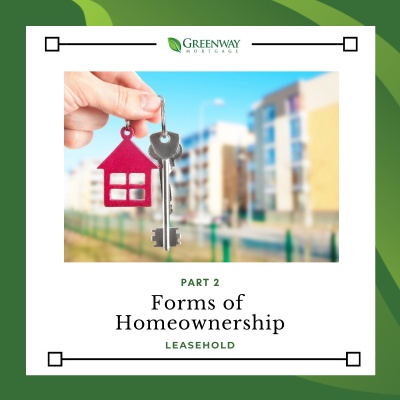Blog

Welcome back to our four-part blog series on the different forms of homeownership. In Part 1, we learned about Fee Simple. In case you missed it, click here to learn more. This week, let's dive into Leasehold Ownership.
You may have never heard of the term “leasehold”. You’re not alone. In fact, its pretty uncommon and only really encountered in New Jersey, New York and Florida.
Basically, someone who buys a leasehold buys the right to live in the building, but does not own the land the building is standing on. Instead, the owner, called the freeholder, grants the buyer use of the building and the surrounding land for a set amount of time in an agreement called a ground lease. A ground lease allows the freeholder to establish how long the leaseholder can live on the property, and requires a down payment. Once paid, the leaseholder pays the freeholder rent, called ground rent, every month. When an agreement is met between both parties, they enter into what’s called a leasehold interest.
Leaseholds are common in commercial properties. Residential leaseholds are rare in the U.S. but exist in New Jersey, New York and Florida. And, unlike apartment leases which are granted in one- and two-year spans, leaseholds can be established between 40-120 years. Once a leasehold expires, full ownership of the property remains to the freeholder.
Can you make improvements on a leasehold?
Under leasehold ownership, you can treat it like you would a home that you own. As long as the changes you want to make meet building codes of the city you live in, you’re free to make improvements. Tenants or leaseholders can choose to make improvements on things such as:
-
Landscaping
-
Painting the house
-
Installing a pool
-
Expanding the property by adding additional rooms (if city approves)
Is it a good idea to make these improvements? It depends. Since the leasehold agreement can last a long time, the tenant may want to renovate. They do so knowing that they won’t be investing in the property for themselves. Once the tenant reaches the end of the lease, the home switches ownership to the freeholder and they will then own the house with all the renovations that have been made.
Leasehold Co-ops:
Leasehold co-ops are also known as ground lease or landlease buildings (popular in New York City). In a leasehold co-op, the co-operative does not own the land that the building sits on, rather, they are leasing it from their landlord.
Leasehold Condos:
In this type of scenario, condo owners get an actual deed and therefore own their property, even though the building is under lease to a larger ownership entity, to which it pays rent.
Fee Simple vs. Leasehold: Which type of ownership has more value for you?
Leaseholds have a lower value than a similar property with fee simple ownership. When comparing valuations of leasehold properties, they should be matched against other leasehold real estate and not properties with fee simple ownership. This will give you a more accurate value of the property. Full fee simple ownership is what most home buyers want because it gives them the most control of their property. However, if you find yourself in a situation that requires leasehold, you may find that it suits you fine and allows you a home of your dreams.
Stay tuned, next time we'll learn more about Housing Cooperative Ownership. In the meantime, feel free to click here to learn more about the different forms of homeownership.


.png)

